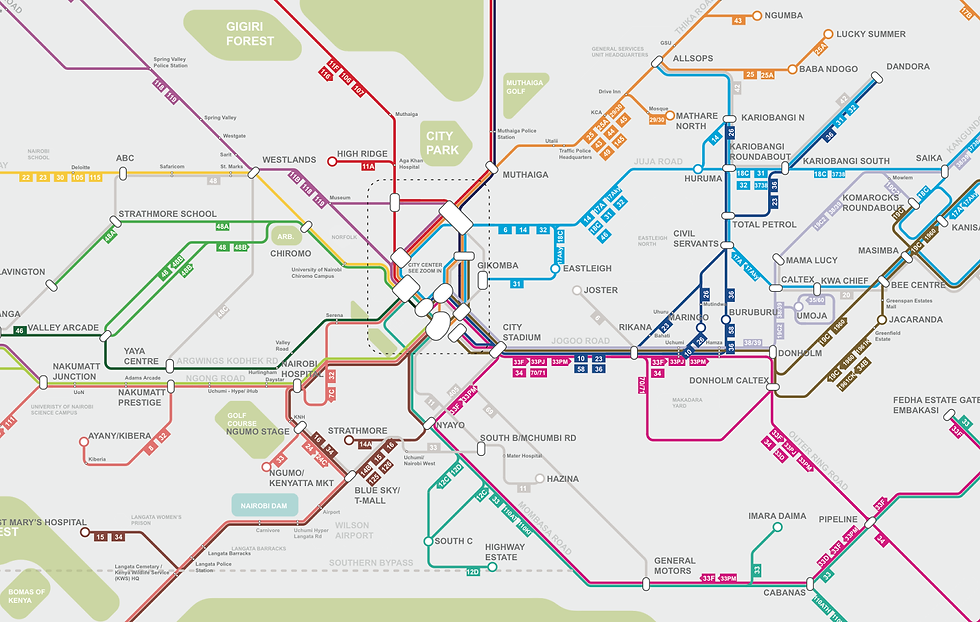Politics in Motion: Unraveling the Matatu System's Impact on Nairobi's Urban Landscape
- sisandasocials
- Oct 21, 2023
- 2 min read
Updated: Nov 10, 2023
Mapping Nairobis Minibuses

Informal transportation, particularly the iconic Matatu system, has been an essential mode of mobility in Nairobi for decades. The city's taxi routes, operated by privately owned minibuses, collectively known as Matatus, offer a vital lifeline for its residents.
The Matatu system, a crucial component of Nairobi's public transportation network, has historically operated in a regulatory grey area (Khayesi, 1999). Mutongi (2017) argues that Matatus have played a central role in the city's social and political life. The routes and schedules of Matatus often reflect political interests and affiliations. For instance, during political campaigns, Matatus are known to display party colours and symbols, essentially turning into mobile billboards for candidates. Such practices have made Matatus an instrument for political mobilization, reflecting the intertwined relationship between transportation and politics. Moreover, the allocation of taxi routes and terminals can be heavily influenced by political connections and patronage.
Heinze (2018) demonstrates that these routes are not always determined by purely logistical or geographical factors but can be the result of negotiations, compromises, and power plays involving politicians and Matatu associations. The allocation of taxi routes in Nairobi often leads to conflicts, both within the Matatu industry and between Matatu operators and other stakeholders, including pedestrians, formal transportation providers, and city authorities. Conflicts arise due to the competitive nature of the industry and the limited resources, such as parking space and passenger pick-up points (Wa-Mungai, 2003).
The licensing of Matatu routes falls under the jurisdiction of the National Transport and Safety Authority (NTSA). Matatu operators are required to obtain route licenses, and routes are often allocated on a first-come, first-served basis. However political connections and negotiations can influence the allocation of routes in some instances (Heinze, 2018). In examining the taxi routes of informal transportation in Nairobi through the lens of urban planning, it becomes evident that this intricate web of politics has found a way to embed themselves in the in workings of taxi routes. There is a mutual understanding of the benefits to all parties involved and, in some ways, this cripples the formalization of the taxi route politics and opens the door to continuous external interference.
References
Khayesi, M., 1999. The struggle for regulatory and economic sphere of influence in the Matatu means of transport in Kenya: A stakeholder analysis.
Heinze, R., 2018. Fighting over urban space: matatu infrastructure and bus stations in Nairobi, 1960–2000. Africa Today, 65(2), pp.3-22.
Mutongi, K., 2017. Matatu: A history of popular transportation in Nairobi (p. 352). University of Chicago Press.
Wa-Mungai, M., 2003. Identity politics in Nairobi matatu folklore (Doctoral dissertation, Department of Jewish and Comparative Folklore The Hebrew University of Jerusalem).



A very nice title for this post.